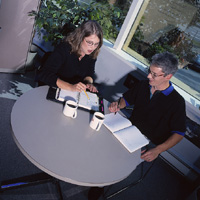We all know that planning for disaster makes sense. Some small businesses even have a business continuity plan in place that they test regularly.
But for many more the problem is simply a lack of time, meaning that if an unplanned event struck that prevented them from trading for any length of time those businesses would be unlikely to survive at all. Nobody wants to be unprepared but those who fail to address this issue are effectively choosing exactly that.
According to Stephen Belshaw of Safe in the Knowledge, small business owners have to focus on the things that really matter and that would put them out of business were they to become unavailable.
He offers the following tips to small business owners looking to safeguard their firm's future without compromising on the day-to-day commitments that come with running a business:
Don't sweat the small stuff
Your business is like
a body. Everything is important but some bits are vital. Prioritise the people,
equipment and information that are crucial. By thinking about which things
matter most, you can focus your time and money on protecting them. So instead
of filing away documents you will never really need, why not back up your
mobile phone SIM card, since it contains all the phone numbers of your key
customers and suppliers?
Keep your finger on the pulse
If something is
important to a business, there's likely to be a product or service out there to
watch over it. There are services which can alert you when your website goes
down, detectors for water leaks, lone-worker monitors and even alarms that can
switch on webcams for you to have a look at your premises
Keep your eyes on the horizon
New laws and
regulations can seriously affect your business. Yet you don't have time to
monitor bills going through parliament or follow the progress of a new
directive taking shape in Brussels.
Join a trade association that will keep abreast of things or sign up for news
alerts from other sources
Let other people be your eyes and ears
Your staff, suppliers
and customers are a large network of potential information. Ensure they know
what matters to you and how to contact you if they learn something important. For
example, an acquaintance might call your mobile straight away when he learns
about a lawsuit involving your biggest customer
Know thy neighbour
Getting to know your
neighbours can produce a range of useful information that may help protect your
business. You could learn that they are a qualified first-aider or that they
are keen to share the cost of anti-vandal paint or CCTV cameras. Alternatively
you may notice that they have no fire extinguishers and a leaky sink located directly
above your computer.
Conduct a risk assessment
Risk assessments are
often used for health and safety issues. But you should be alert to any hazard
that might damage your business. Imagine if you wanted to sabotage your own
business. You will realise how easy would it be to break
in, overload that shelf which is above your computer, block that drain cover in
the warehouse or ring the Health and Safety Executive about your staff using
the wrong ladders
Single points of failure
Try to spot the single
points of failure in your business. This can be the one piece of equipment
which could bring your entire operation to a halt, though it may not be just
equipment you are overly reliant on. It could be a person, a customer or a
supplier
Damage limitation
Things will no doubt
go wrong at some point. How you react can avoid calamity and will also be seen
as a measure of your professionalism. A business continuity plan is essential.
It details how you plan to cope when things go wrong. So when the customer
calls you in a panic you can reply: ‘Yes we had a fire over the weekend. But we
have arrangements to work elsewhere and alternate stock supplies. Your
deliveries will happen as normal. We won't let you down.'
Get some outside perspective
There is a reason why
we don't let our children mark their own exams. It is too easy to be complacent
and think we have solved all the problems. It can be really useful to get some
outside perspective on where your business might be vulnerable. There are a
variety of sources that can offer opinions on your security, business
continuity or emergency plans, for example, local crime prevention officers,
health and safety officers, fire brigade, suppliers/customers and insurers
Here today gone tomorrow
Things change. Your
business environment is in a constant state of flux. The person or problem that
was a threat yesterday may be gone today. Alternatively you may be faced with a
whole set of new risks when you move offices, install new equipment, downsize
or grow. Schedule some time every few months to reassess your business risks,
so that you are here both today and tomorrow.
For more information about managing risk and business continuity planning visit www.SafeintheKnowledge.com






